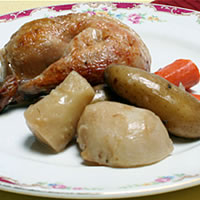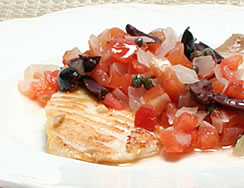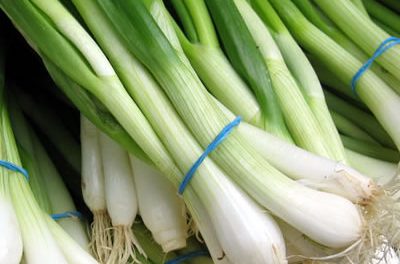A roast chicken dinner is one of life's true pleasures. Depending on how the bird is presented (and what accompanies it), the meal can take on many different characteristics - from romance to comfort to festiveness.
For a romantic touch, try preceding the meal with fresh oysters and accompany the chicken with wild rice. Serve with roasted root vegetables for a down-home feel. And for celebrations, you might serve the bird on a bed of watercress, encircled by tiny lady apples that have been poached in spiced cider.
Traditionally, I have served a roasted capon (a rooster - in effect, a very large chicken) at holiday gatherings. These days, however, with fewer mouths to feed, I often opt for chicken instead. To highlight the special occasion, I try to splurge on the best-quality bird my budget can afford. It impresses my guests, but more importantly, it impresses their taste buds.
The price range for chickens can vary dramatically. The most expensive varieties are typically locally raised and can often be found at a farmers' market. Organic birds are available at most supermarkets but can be quite pricey too. Air-chilled chickens, also high-end, are gaining popularity as well. These birds are processed using air-chilling chambers rather than conventional water chillers and are often more tender. If a chicken is air chilled, it will be marked prominently on the label.
This roast chicken recipe speaks of pure comfort food. Placing the chicken on a bed of root vegetable eliminates the need for a rack in the roasting pan and adds rich flavor to the pan juices that can be used to create home-made gravy. To flavor the chicken itself, place garlic cloves, lemon slices or fresh rosemary branches inside the bird. A small amount of butter rubbed on the skin helps it brown during cooking.
Finally, for succulence, I firmly believe in rotating the bird. Starting with the breast down, I recommend turning it partway through roasting. Trussing (or tying) the chicken before cooking is optional. While it gives the bird a nice shape and holds its legs in place, do note that it also adds to the cooking time.
Roasted Chicken with Root Vegetables
Yield: Makes 5 servings
- 1 fennel bulb
- 2 onions, halved
- 2 white turnips, peeled and halved
- 1 large carrot, cut in 2-inch pieces
- 1 parsnip, peeled and cut in 2-inch pieces
- One chicken (about 4 pounds)
- 1 lemon, quartered
- Salt and ground black pepper, to taste
- 2 tsp. unsalted butter, softened
- 1/2 cup fat-free, reduced sodium chicken broth
- 2 tsp. olive oil
- 8 fingerling or red-skinned new potatoes
Directions
- Preheat oven to 450 degrees F.
- Cut off the stems and feathery leaves from the fennel bulb and discard. Halve the bulb lengthwise then cut each half crosswise, making 4 quarters. If the core is very tough, trim away part of it, leaving enough so the wedges hold together. Place the fennel, onions, turnips, carrot, and parsnips in a roasting pan just large enough to hold them in one layer.
- Rinse the chicken and pat dry inside and out with paper towels. Insert the lemon into the cavity. Using your fingertips, loosen the skin on the chicken's breast, being careful not to tear it. Rub with some salt and pepper over the breast. Smear 1 tsp. of the butter under the skin, smoothing it over the breast by massaging the skin over the breast from the outside.
- Set the chicken, breast down, on top of the vegetables in the roasting pan. Pour in the broth. Roast the bird for 15 minutes. Remove from the oven, turn the chicken breast side up, and brush the it all over with the oil. Reduce the oven temperature to 350 degrees F. and roast for 30 minutes.
- Add the potatoes to the roasting pan. Baste the chicken and vegetables with the pan juices until the potatoes are shiny. Continue to roast the chicken until it is cooked through, 45-55 minutes (on an instant-read thermometer, the breast should read 160 degrees and the thighs 170 degrees).
- Remove the chicken to a cutting board and let sit 15 minutes to allow the juices to settle. If the vegetables are not tender when easily pierced with a knife, let them continue roasting until the chicken is carved.
- When the vegetables are done, transfer them to a serving platter. Pour the pan juices into a measuring cup and let sit 5 minutes. Using a wide, shallow soup spoon, skim off as much of the fat as possible from the top. Carve the chicken and arrange the pieces and sliced breast meat over the roasted vegetables. Serve immediately, passing the pan juices in a gravy pitcher.
Nutritional Information Per Serving:
320 calories
8 g total fat
3 g saturated fat
23 g carbohydrate
38 g protein
5 g dietary fiber
260 mg sodium












